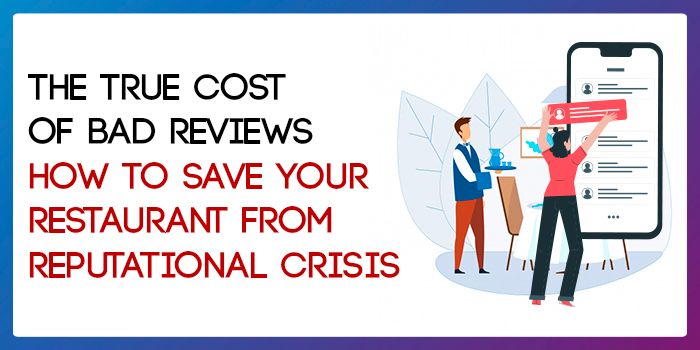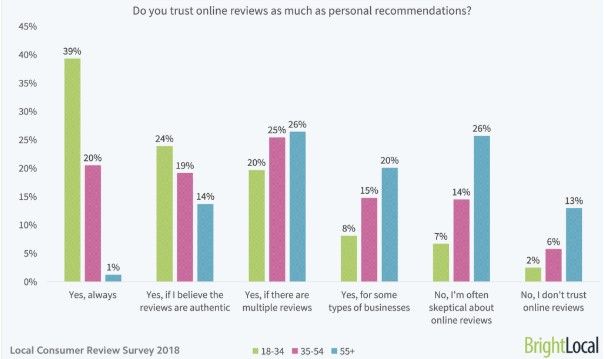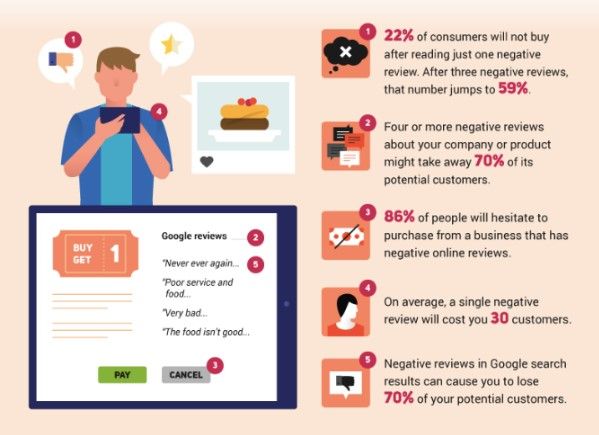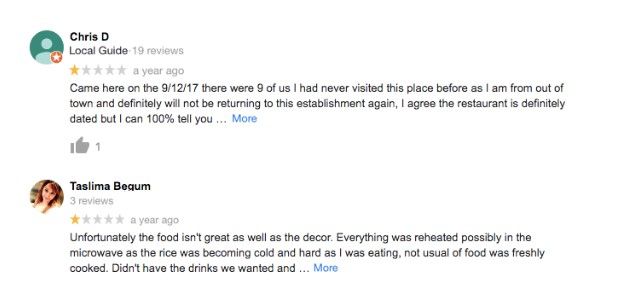The True Cost of Bad Reviews: How to Save Your Restaurant from Reputational Crisis
18 October, 2022

Vitaliy Zhovtyuk
CEO / Managing Director
& Founder

User-generated content is powerful enough to make or break your restaurant's reputation. Negative comments, videos, and live streams can start trending online in the blink of an eye.
If you're not listening carefully and engaging with customers proactively, you're running a risk of finding yourself in the middle of a reputational crisis. In this article, we'll show you how regular monitoring of what customers say about your brand online can help you have your restaurant full of people at peak dinner times and even save it from reputational damage.
Why review matters
In the perfect business world, ads convert 100% of potential customers into brand advocates. But it's not how things work in reality. Advertising alone is not enough. If a customer is interested in your product or service, they'll read for about ten online reviews before feeling able to trust your brand.
According to the Local Consumer Review Survey, 91% of millennials rely on reviews as much as personal recommendations. A positive reputation helps customers trust your brand, converts searchers into leads, and increases local search rankings.

The restaurant industry is more impacted by negative reviews than any other. What happens when your restaurant gets a poor online review? You immediately start losing your would-be customers.
On average, a single negative review can cost you 22% of customers. The number rises to 59% after three negative reviews, while four or more negative reviews about your brand might take away 70% of potential customers.
92% won't do business with companies with less than four out of five stars. Browsing the first page of your Google search results will be enough for them to build their solid impression of your restaurant. If they find negative articles or bad reviews, they'll likely opt for a competitor with a higher ranking.

How to save your restaurant from the reputational crisis? First of all, you should realize what influence your online ranking has on your profit. According to the Harvard Business School study, just a one-star improvement in Yelp rating can increase revenue from 5 to 9%.
The difference between a three-star and five-star rating can rise to 18%. This means if you run a restaurant with €1 million in annual revenue, you should be ready to lose as much as €180,000 per year because of a poor reputation.
Your customers are online, and they're eager to share their experience, especially negative ones, on social media platforms and local community boards. Even if you spend a more significant part of your marketing budget on online promotion, there is a risk of losing your potential visitors along the way once they encounter negative reviews of your brand.
Reputation crisis on the horizon
Think reputational crisis can't happen to your restaurant? Think again. Every company is vulnerable to disaster, whether it's a local brand or a global restaurant chain. The question is not if it occurs, but how you prepare for it. You certainly don't want to be caught off guard by unexpected news about your brand.
Last year, an Indian restaurant in Lincoln, England, was permanently closed after getting a food hygiene rating of 'one' with significant improvements required from City Council officers. The Royal Tandoori has mixed reviews with 3.4 stars on Google, and 3.5 stars on TripAdvisor. The restaurant didn't do anything to restore its poor reputation online and never responded to any customer reviews.

Even the tiniest issue can snowball into a reputation crisis if you do nothing with it. The faster you detect risks by monitoring your brand's online presence, the better chance you have to prevent a potential disaster.
Leaving reviews on platforms like Google, TripAdvisor, and Yelp are popular among users so far. But snapping food photos and sharing them on Instagram or Facebook is a key part of eating out for many people as well. Every day millions of users share their dining experience through posts and stories on social media platforms. Keeping track of them is a perfect opportunity for restaurants to get the latest customers' insights.
What's next: Make the best of bad reviews
Once you find negative or fake reviews, you should have a detailed plan focused on recovering company image. Negativity often takes a brand by surprise, but preparing a crisis management strategy beforehand can help you prevent a storm.
Here are five practical steps to protect your business from the reputational damage:
Monitor your brand image online. Regular social media listening is a sure way to stay vigilant by identifying what is being said about your restaurant online. Making a quick check every day will help you learn what your customers think and keep an eye on every review.
Calculate reputational risk. Do you know how much revenue you're losing because of negative reviews? Well, it's pretty easy to measure the impact of negative Google search results and poor Yelp reviews based on Forbes formulas. As mentioned above, negative reviews on Yelp can seriously harm not only your reputation but revenue as well. Here is the formula you can use to estimate your amount of lost revenue: % Lost Revenue = (5 − Star rating) × 0.07. If you have a 3-star rating, you're two stars away from 5. Multiple 2 × 0.07 = 0.14. That's 140 % of lost revenue. If your total revenue for the last year equals €500.000, you should do: 0.14 × 500.000 = €70 000 in lost revenue.
Respond to negative reviews professionally. When you deal with an unsatisfied customer who made a complaint about your restaurant, thank your guest for their feedback, apologize, and ask to continue a conversation offline. Finding a quick and effective solution to customers' problems keeps them coming back. A rude response to a legitimate complaint can cause more harm to your reputation than the original criticism. Most people are willing to overlook a few bad reviews if you show your readiness to navigate conflict.
Prevent bad reviews before they appear online. Always listen to your customers and allow them to express their critical feedback before they share their poor experience online. It's cheaper to apologize and offer a refund right away than put this situation on the web for the whole world to see.
Encourage customers to leave reviews. According to the survey, 68% of customers are willing to write reviews if asked. So why not invite happy customers to share their feedback. Use signs, stickers, or table toppers that prompt diners to give your restaurant a review on the platforms you use. And don't forget to thank them in response.
It takes a lot of time to build a solid reputation, but even a half-star drop in your rating can drive customers away from your restaurant. Make sure to check reviews and mentions of your brand on the web at least once a day to avoid reputational risks.
Although brand reputation is fragile, there is no problem you can't solve with proper tools and a comprehensive crisis management plan.
How do you protect your restaurant from a reputational crisis? Leave a comment!
Check out our article: “The restaurant of the future: What it looks like?" to find out more about the latest global trends in the restaurant industry.



